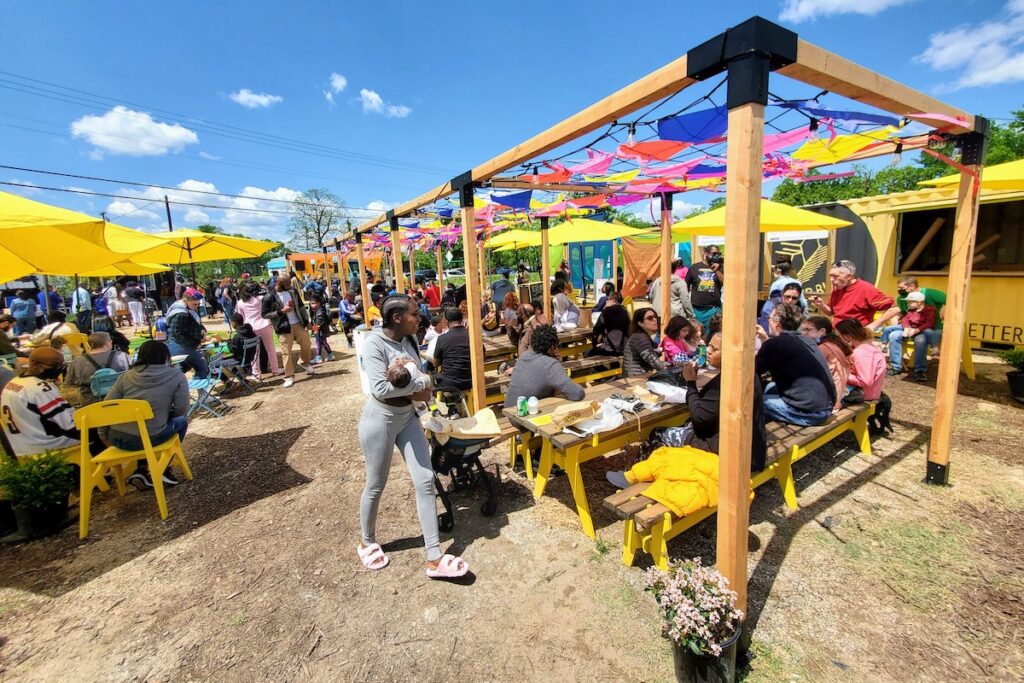The Dallas City Council made it easier Wednesday for mobile food vendors to do business. The body unanimously approved rewriting the dated code governing food trailers, trucks, and carts. Permits will cost less and won’t require so many trips to City Hall. Fees have been dropped. Chefs can now cook raw fish and poultry on-site without having to do it at a commissary and transport it to their truck or trailer. And they will have to travel to that commissary only once a week instead of once per day.
I wrote about the changes in detail when the matter passed the Quality of Life Committee last month. Council passed that same ordinance, with the promise of returning in a year to further tweak it. The new ordinance will also remove language requiring vendors to put wheels on their shipping containers.
Dallas was in the Dark Ages when it came to regulating what it has termed “mobile food units.” Food trucks, which usually cost in the six figures, had to get a permit only once a year. Trailers had to get one each time they served and could operate only during events. Trailers typically cost around $20,000, meaning the added regulations were pricing out many entrepreneurs. Carts, the cheapest of all, had to pay more in fees than all of their larger brethren.
None of it made sense.
City staff compared regulations in Dallas to other cities and found us to be on our own island. Food entrepreneurs couldn’t convert a trailer or a vehicle; they had to buy one that was commercially manufactured to serve food. The city blocked trailers from operating anywhere other than a permitted temporary event. It even regulated what type of food could be cooked and how. Fish and chicken had to be breaded and go directly from the freezer to the deep fryer. No other city went that far.
Today’s vote changes that, and it’s terrific news for the public just as it is for the chefs and businesspeople who want to start small and avoid the expense of a brick and mortar. (And certainly for those who couldn’t afford restaurant space.)
Dallas lacks the vibrancy of cities that have a low barrier of entry for mobile food vendors. Austin’s Distant Relatives was nominated for a James Beard award—and it operated out of a trailer next to a brewery. Dallas’ previous code basically prevented that sort of innovation and achievement from happening here.
This ordinance also creates a few pilot zones to allow trucks and trailers to serve without having to pay any fees. One will be downtown, at Pacific Plaza, but the especially exciting one will be at Kiest Park, in Oak Cliff’s District 4. The city had to open its eyes after a similar project in South Dallas, on Martin Luther King Jr. Boulevard. That event, the MLK Food Park, attracted over 5,500 people the eight days it was operating.
“What this does, first and foremost, is it cuts the barrier of entry, the capital cost to get into this, by 50 percent or more. Then it cuts operational costs by 50 percent or more,” said Jason Boso, who owns both Lower Greenville’s Truck Yard and a commissary. He helped write the language in the ordinance. “This opens up this entrepreneurial business for diversity. It opens it up to underprivileged communities. That is going to benefit our city so greatly by having more variety of food options, by having a more diverse food culture, by creating a larger community here, thereby creating competition, thereby elevating the level of food.”
And that’s why you should be excited that the city rolled this back.
Get the D Brief Newsletter
Author




